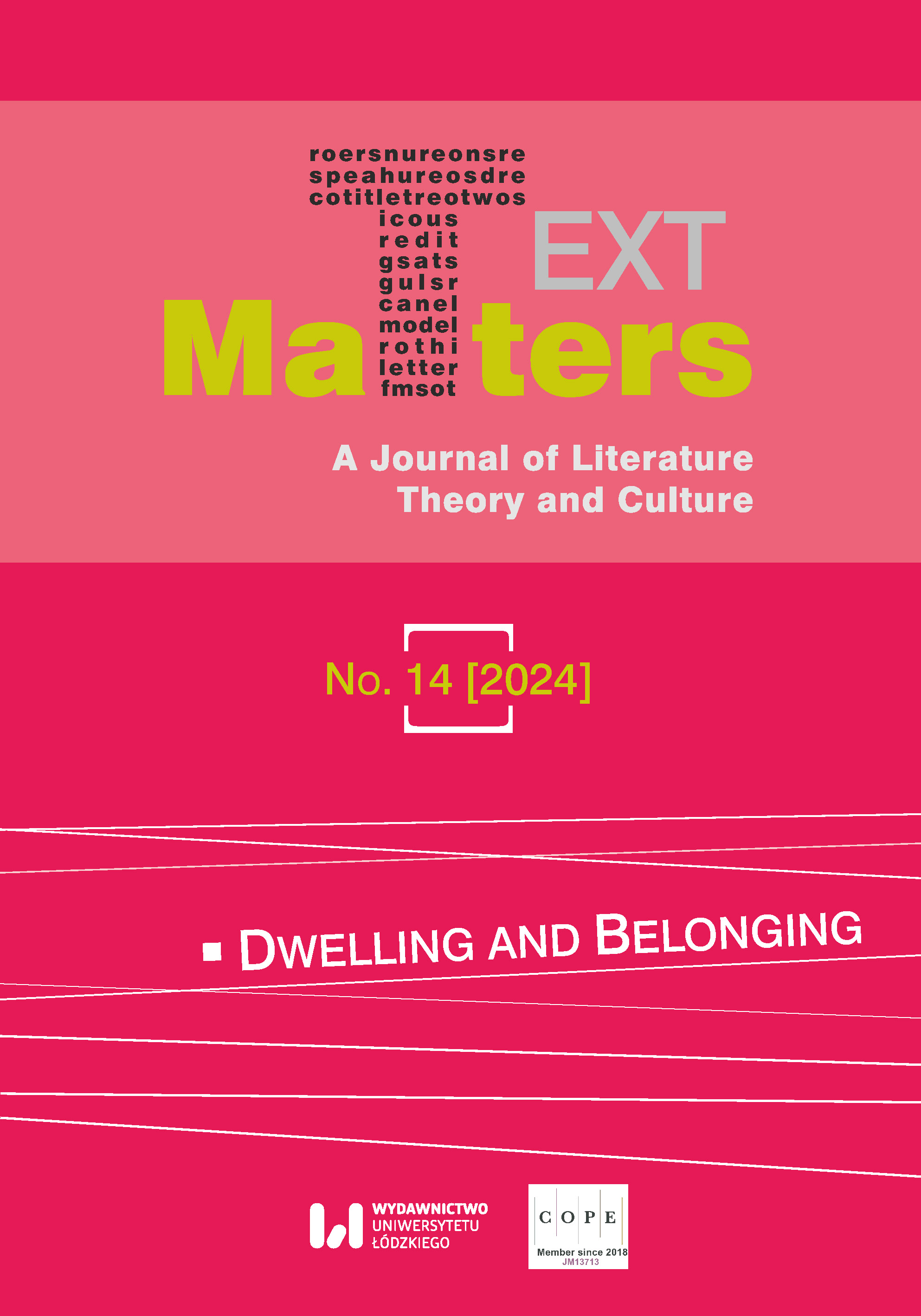Voices of the Dead: Robert Eggers’s The Lighthouse and the Horror Genre
DOI:
https://doi.org/10.18778/2083-2931.14.24Keywords:
horror, cinema, Robert Eggers, Noël Carroll, genreAbstract
This article examines the 2019 film The Lighthouse, directed by Robert Eggers, which follows the descent into madness of two 19th-century lighthouse keepers as they become stranded on a desolate New England island and confronted with threats both natural and supernatural. The focus of the article is primarily on the film’s employment of the cinematic language associated with the horror genre, discussed primarily in reference to the theoretical framework proposed by Noël Carroll, and thus it serves as the argument for The Lighthouse’s inclusion into the genre. I place particular emphasis on the considerations of human nature present in the film. The Lighthouse illustrates the disastrous impact of finding oneself outside of the boundaries of civilization; without the constraints imposed by society, but also without the sense of security it offers, the evil that can be found in every human being is revealed and the characters turn against each other.
Downloads
References
Bitel, Anton. “Voices of the Undead: Robert Eggers on The Witch.” Sight & Sound, 11 July 2016, https://www2.bfi.org.uk/news-opinion/sight-sound-magazine/interviews/robert-eggers-witch accessed 2 May 2023.
Google Scholar
Black, Martha Fodaski. “Irony in Joseph Conrad’s ‘An Outpost of Progress.’” The Conradian, vol. 10, no. 2, 1985, pp. 132–34.
Google Scholar
Bradshaw, Peter. “The Lighthouse Review—Robert Pattinson Shines in Sublime Maritime Nightmare.” The Guardian, 19 May 2019, http://www.theguardian.com/film/2019/may/19/the-lighthouse-review-robert-pattinson-shines-in-sublime-maritime-nightmare accessed 11 June 2023.
Google Scholar
Carroll, Noël. The Philosophy of Horror. Routledge, 1990. https://doi.org/10.4324/9780203361894
Google Scholar
DOI: https://doi.org/10.4324/9780203361894
Church, David. Post-Horror: Art, Genre and Cultural Elevation. Edinburgh UP, 2021. https://doi.org/10.1515/9781474475907
Google Scholar
DOI: https://doi.org/10.1515/9781474475907
Cohen, Jeffrey Jerome. “Monster Culture (Seven Theses).” Monster Theory: Reading Culture, edited by Jeffrey Jerome Cohen, U of Minnesota P, 1996, pp. 3–25. https://doi.org/10.5749/j.ctttsq4d
Google Scholar
DOI: https://doi.org/10.5749/j.ctttsq4d.4
Conrad, Joseph. “An Outpost of Progress.” Tales of Unrest, T. Fisher Unwin, 1898, pp. 124–70.
Google Scholar
Crucchiola, Jordan. “How The Witch’s Director Made His Film so Terrifying.” WIRED, 20 Feb. 2016, http://www.wired.com/2016/02/robert-eggers-set-design-how-he-made-the-witch-so-scary/ accessed 3 May 2023.
Google Scholar
Cutler, Evelyn Starr. “Representation of Maine Coast Dialect in the Work of Sarah Orne Jewett.” 1976. New York University, PhD thesis.
Google Scholar
Dargis, Manohla. “The Lighthouse Review: Dark Nights, Troubled Souls, Hairy Men.” The New York Times, 16 Oct. 2019, https://www.nytimes.com/2019/10/16/movies/the-lighthouse-review.html accessed 11 June 2023.
Google Scholar
Douglas, Mary. Purity and Danger: An Analysis of the Concepts of Pollution and Taboo. Routledge, 2001.
Google Scholar
Ebiri, Bilge. “Robert Eggers on The Lighthouse, His Bleakly Gorgeous Follow-up to The Witch.” Vulture, 3 Sept. 2019, http://www.vulture.com/2019/09/robert-eggers-the-lighthouse.html accessed 11 June 2023.
Google Scholar
Eggers, Robert. The Witch Script. Script Slug, 11 Oct. 2013, https://assets.scriptslug.com/live/pdf/scripts/the-witch-2016.pdf accessed 3 May 2023.
Google Scholar
Fear, David. “Drunken Sailors & Movie Stars: The Making of The Lighthouse.” Rolling Stone, 25 Oct. 2019, http://www.rollingstone.com/tv-movies/tv-movie-features/robert-eggers-the-lighthouse-interview-898545/ accessed 3 May 2023.
Google Scholar
Felluga, Dino. Critical Theory: The Key Concepts (1st Edition). Routledge, 2015. https://doi.org/10.4324/9781315718873
Google Scholar
DOI: https://doi.org/10.4324/9781315718873
Foucault, Michel, and Jay Miskowiec. “Of Other Spaces.” Diacritics, vol. 16, no. 1, 1986, pp. 22–27. https://doi.org/10.2307/464648
Google Scholar
DOI: https://doi.org/10.2307/464648
Fraser, Gail. “Conrad’s Irony: ‘An Outpost of Progress’ and The Secret Agent.” The Conradian, vol. 11, no. 2, 1986, pp. 155–69.
Google Scholar
Gleiberman, Owen. “The Lighthouse Review: Pattinson, Dafoe Fight Spirits and Each Other.” Variety, 19 May 2019, https://variety.com/2019/film/reviews/the-lighthouse-review-robert-pattinson-willem-dafoe-1203220127/ accessed 11 June 2023.
Google Scholar
“Jarin Blaschke on The Lighthouse” (Robert Eggers, 2019).” YouTube, uploaded by Cinematographers on cinematography, 20 Aug. 2020, http://www.youtube.com/watch?v=PJ3qaDUvvyo accessed 3 May 2023.
Google Scholar
Johnston, Nick. “Interview: Robert Eggers on the ‘Weird Fiction’ of His New Film The Lighthouse.” Vanyaland, 21 Oct. 2019, https://vanyaland.com/2019/10/21/interview-robert-eggers-on-the-weird-fiction-of-his-new-film-the-lighthouse/ accessed 3 May 2023.
Google Scholar
Kristeva, Julia. Powers of Horror: An Essay on Abjection. Columbia UP, 1982.
Google Scholar
Miéville, China. “Weird Fiction.” The Routledge Companion to Science Fiction. 1st Edition, edited by Mark Bould et al., Routledge, 2009, pp. 510–15.
Google Scholar
Primo, Jacqueline. “The Making of The Lighthouse.” mydigitalpublication.com, 12 Nov. 2019, http://www.mydigitalpublication.com/publication/?i=633756&article_id=3529287&view=articleBrowser accessed 3 May 2023.
Google Scholar
Rutledge, Thais, and Robert T. Tally. “Formed by Place: Spatiality, Irony, and Empire in Conrad’s ‘An Outpost of Progress.’” Transnational Literature, vol. 9, no. 1, 2016, pp. 1–16.
Google Scholar
Said, Edward W. Joseph Conrad and the Fiction of Autobiography. Columbia UP, 2008.
Google Scholar
The Innocents. Directed by Jack Clayton, performances by Deborah Kerr and Peter Wyngarde, 20th Century Fox, 1961.
Google Scholar
The Lighthouse. Directed by Robert Eggers, performances by Robert Pattinson and Willem Dafoe, A24, 2019.
Google Scholar
“The Patches Podcast 003. Apprehension.” pATCHES, 2014, https://podcasts.apple.com/us/podcast/003-apprehension-mark-korven/id1232678351?i=1000390284914 accessed 3 May 2023.
Google Scholar
The Witch. Directed by Robert Eggers, performances by Anya Taylor-Joy and Ralph Ineson, A24, 2015.
Google Scholar
Thomson, Patricia. “Stormy Isle: The Lighthouse.” The American Society of Cinematographers, 13 Jan. 2020, https://theasc.com/articles/stormy-isle-the-lighthouse accessed 2 May 2023.
Google Scholar
Downloads
Published
Versions
- 2024-11-28 (2)
- 2024-11-28 (1)
How to Cite
Issue
Section
License

This work is licensed under a Creative Commons Attribution-NonCommercial-NoDerivatives 4.0 International License.













